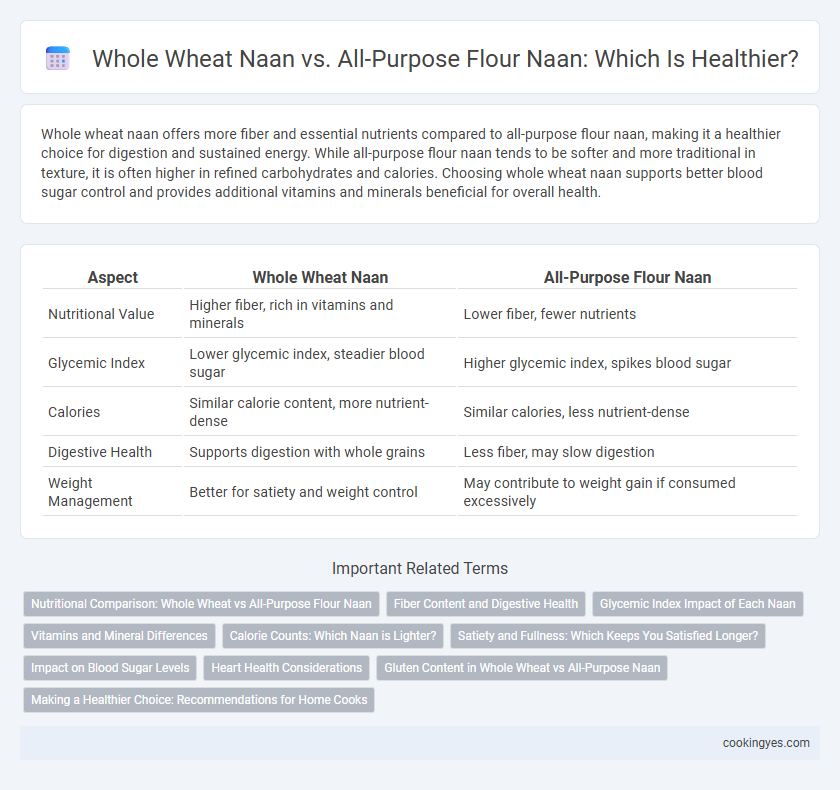Whole wheat naan offers more fiber and essential nutrients compared to all-purpose flour naan, making it a healthier choice for digestion and sustained energy. While all-purpose flour naan tends to be softer and more traditional in texture, it is often higher in refined carbohydrates and calories. Choosing whole wheat naan supports better blood sugar control and provides additional vitamins and minerals beneficial for overall health.
Table of Comparison
| Aspect | Whole Wheat Naan | All-Purpose Flour Naan |
|---|---|---|
| Nutritional Value | Higher fiber, rich in vitamins and minerals | Lower fiber, fewer nutrients |
| Glycemic Index | Lower glycemic index, steadier blood sugar | Higher glycemic index, spikes blood sugar |
| Calories | Similar calorie content, more nutrient-dense | Similar calories, less nutrient-dense |
| Digestive Health | Supports digestion with whole grains | Less fiber, may slow digestion |
| Weight Management | Better for satiety and weight control | May contribute to weight gain if consumed excessively |
Nutritional Comparison: Whole Wheat vs All-Purpose Flour Naan
Whole wheat naan contains higher fiber content, essential vitamins, and minerals such as iron and magnesium compared to all-purpose flour naan, which is primarily made from refined flour with lower nutritional density. The complex carbohydrates in whole wheat naan promote better blood sugar regulation and sustained energy release, whereas all-purpose flour naan tends to cause quicker glucose spikes. Choosing whole wheat naan supports digestive health and provides more antioxidants, making it a more nutrient-rich option for health-conscious consumers.
Fiber Content and Digestive Health
Whole wheat naan contains significantly higher dietary fiber compared to all-purpose flour naan, promoting better digestive health by supporting regular bowel movements and preventing constipation. The bran and germ in whole wheat contribute essential nutrients and prebiotic fibers that enhance gut microbiota diversity. In contrast, all-purpose flour naan lacks these components, resulting in lower fiber content and reduced benefits for digestion.
Glycemic Index Impact of Each Naan
Whole wheat naan contains more fiber and complex carbohydrates, resulting in a lower glycemic index compared to all-purpose flour naan, which often causes faster blood sugar spikes. The higher fiber content in whole wheat naan promotes better blood sugar regulation and sustained energy release. Choosing whole wheat naan may contribute to improved glycemic control, especially for individuals managing diabetes or insulin sensitivity.
Vitamins and Mineral Differences
Whole wheat naan contains higher levels of essential vitamins and minerals, including B vitamins, iron, magnesium, and zinc, due to the use of whole grain flour that retains the bran and germ. All-purpose flour naan typically lacks these nutrients because it is made from refined flour, which is stripped of fiber and many micronutrients during processing. Choosing whole wheat naan supports better nutrient intake and contributes to improved digestive health and sustained energy release.
Calorie Counts: Which Naan is Lighter?
Whole wheat naan typically contains fewer calories and more dietary fiber compared to all-purpose flour naan, making it a lighter and more nutrient-dense option. The higher fiber content in whole wheat naan aids digestion and promotes satiety, contributing to better weight management. Choosing whole wheat naan reduces calorie intake per serving while enhancing overall nutritional benefits.
Satiety and Fullness: Which Keeps You Satisfied Longer?
Whole wheat naan contains more dietary fiber and complex carbohydrates than all-purpose flour naan, promoting longer-lasting satiety and stable blood sugar levels. The higher fiber content in whole wheat naan slows digestion, helping maintain fullness and reducing hunger pangs over time. In contrast, all-purpose flour naan, made from refined flour, is digested more quickly, often leading to quicker hunger recurrence.
Impact on Blood Sugar Levels
Whole wheat naan has a lower glycemic index compared to all-purpose flour naan, resulting in a slower and steadier rise in blood sugar levels. Its higher fiber content helps improve blood sugar control by slowing carbohydrate absorption and increasing satiety. Choosing whole wheat naan supports better glycemic management, making it a healthier option for individuals monitoring blood sugar.
Heart Health Considerations
Whole wheat naan contains higher fiber content and essential nutrients, like magnesium and antioxidants, which contribute to improved heart health by helping regulate cholesterol levels and reducing inflammation. In contrast, naan made with all-purpose flour typically has lower fiber and nutrient density, potentially leading to quicker spikes in blood sugar and less cardiovascular benefit. Choosing whole wheat naan supports heart health through better blood lipid management and enhanced vascular function.
Gluten Content in Whole Wheat vs All-Purpose Naan
Whole wheat naan contains more fiber and nutrients but also has a higher gluten content compared to all-purpose flour naan, which is made from refined flour with lower gluten levels. The increased gluten in whole wheat naan may cause digestive issues for those with gluten sensitivity or celiac disease. For individuals prioritizing digestive health, all-purpose flour naan offers a milder gluten content, while whole wheat naan provides greater nutritional value.
Making a Healthier Choice: Recommendations for Home Cooks
Whole wheat naan offers more fiber, vitamins, and minerals compared to all-purpose flour naan, promoting better digestion and sustained energy levels. Using whole wheat flour not only increases nutritional value but also provides a lower glycemic index, helping to manage blood sugar more effectively. Home cooks can enhance health benefits by incorporating yogurt or olive oil to improve texture and flavor while maintaining a nutrient-dense bread option.
Whole Wheat Naan vs All-Purpose Flour Naan for Health Infographic

 cookingyes.com
cookingyes.com